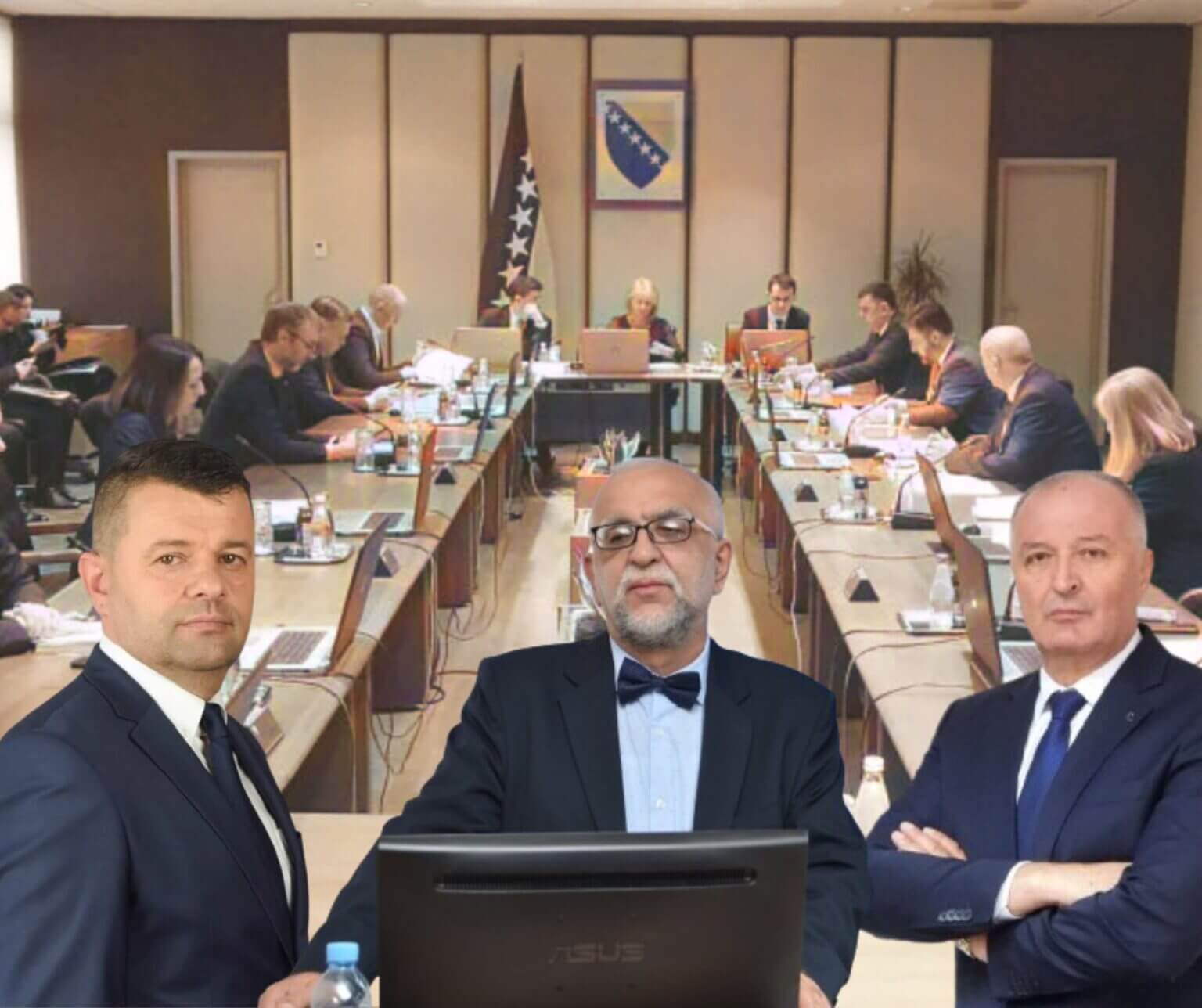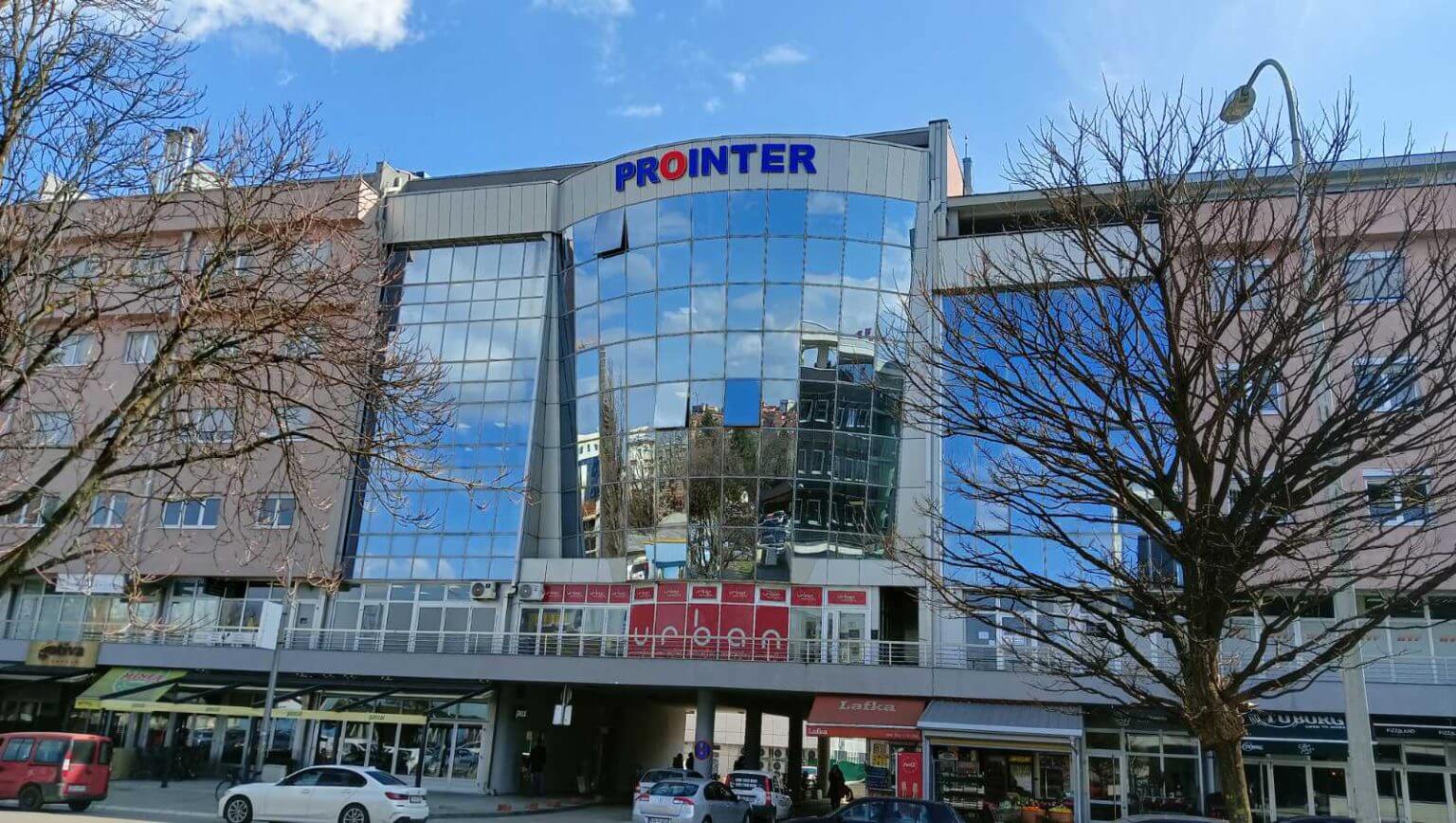Selecting officials is more complex than the space program. Candidacies are accepted or rejected without explanation, the Helez – Hurtić deal raises doubts, funds are returned to donors due to inaction, a new report acknowledges “some” progress, whilst more than 78% of planned objectives remain unfulfilled.
It is possible that the Council of Ministers of BiH and the General Secretariat have violated the Constitution of BiH and committed a criminal offense by conducting a public vacancy for the selection of the deputy coordinator for public administration reform in BiH.
Wasn’t officially notified
This claim is made by Samir Sabljica, who holds a PhD in Administrative Sciences and was the only candidate to meet the conditions in the contested vacancy from May 2024.
– I was never officially notified of the rejection of my candidacy. My only source of information is the announcement from the 48th session of the BiH Council of Ministers. However, this announcement is not a legal document that can be challenged in court, and I am not obligated to follow the website. According to Article 57 of the Rules of Procedure of the Council of Ministers of Bosnia and Herzegovina, the CoM BiH was required to issue a decision or another legal act. I believe this was not done intentionally to prevent me from having the opportunity to appeal. Additionally, Amira Mašović has made unlawful financial gain by receiving and continuing to receive salaries as a deputy coordinator that she is not entitle to receive – said Sabljica for Interview.
He added that he will not apply for the new vacancy since everything has become senseless.
Helez – Hurtić deal
It is worth mentioning that the BiH Council of Ministers has at the beginning of June 2024 narrowly decided, after two rounds of voting and additional consultations, to extend the mandate of the current acting deputy coordinator for public administration reform, Amira Mašović, for another three months.
Before that, the BiH CoM had again agonized over the decision to cancel the vacancy, which it ultimately did. Samir Sabljica was the only person who applied to meet all the conditions of the vacancy. Subsequently, they decided to announce a new vacancy.
– These events from May and June 2024 represent an orchestrated effort to appoint Amira Mašović, the wife of retired former general Senad Mašović. Despite being the sole candidate the BiH Council of Ministers appointed Amira Mašović as acting deputy coordinator. I possess all qualifications—a law degree, a PhD in administrative sciences, and more. But, I was in the way of prior agreement between Zukan Helez and Sevlid Hurtić to have Amira Mašović appointed. She is from Grapska near Doboj, and Sevlid Hurtić is also from there, and I believe they are of the same age and that they know each other well. Additionally, Helez has connections with Senad Mašović through the Ministry of Defense. Amira didn’t apply on time, so they annulled the vacancy – said Sabljica.
He also mentions that he applied for the initial vacancy for the coordinator’s position in February 2024. However, at that time, the BiH CoM independently appointed him to the role of acting deputy, which he declined.
And all in line with the law…
The BiH CoM’s press release of May 13, 2024, referenced by Sabljica, reads that the Report on the conducted vacancy was reviewed, and the appointment of Samir Sabljica as deputy coordinator for public administration reform, despite being the sole candidate in the public tender, was not approved. The press release highlighted suspicions of procedural violations under the Law on Ministerial Appointments, Appointments of the Council of Ministers, and other appointments of Bosnia and Herzegovina.
Amira Mašović, who was appointed in March of this year, continues to fulfill the role of acting deputy coordinator for public administration reform.
Sabljica believes that this appointment violates the provisions of the Constitution of BiH and the European Convention for the Protection of Human Rights and Fundamental Freedoms, particularly regarding the right to legal recourse. He also alleges violations of the Criminal Code of BiH, specifically regarding abuse of position or authority (Articles 220 and 224).
The BiH CoM’s Secretariat is hiding the ranking lists of candidates
Before the complications arose with the appointment of the second deputy coordinator, in February 2024, Darko Kasap (Public Relations Manager, university degree, the Faculty of Philosophy, University of Mostar, and previously Deputy Coordinator for Public Administration Reform) was appointed as coordinator, while Miloš Golijanin (with a master’s degree in Security and Peace Studies, formerly Head of the Cabinet of the Director of the Employment Service of the RS) was appointed deputy coordinator.

As a reminder, in August 2023, the BiH Council of Ministers issued a decision outlining the criteria for selecting public administration reform coordinators and deputies. These criteria stipulated that candidates must be over 18 years old; citizens of Bosnia and Herzegovina; and have not been dismissed from civil service positions in BiH or entity institutions due to disciplinary measures within the three years preceding the vacancy announcement. Additionally, they must not be subject to the provisions of Article IX.1 of the Constitution of Bosnia and Herzegovina.
Special requirements for the coordinator also included a degree in social sciences (faculty); a higher academic degree (master’s or PhD) was preferred; at least five years of professional experience, with a minimum of three years in managerial positions; good knowledge of public administration or public administration reform; a comprehensive multidisciplinary approach; strong operational and organizational skills; emphasized leadership and communication abilities; and proficiency in the English language.
Special requirements
The specific requirements for the deputy coordinator include a degree from a faculty of social studies; a minimum of five years of professional experience, with at least three years in managerial roles; strong understanding of public administration reform issues and demonstrated analytical knowledge and management experience; desirable familiarity with public procurement procedures; excellent presentation and communication skills; and proficiency in the English language.
Additionally, the Decision stipulates that the coordinator and two deputy coordinators for public administration reform cannot be from the same constituent people.
The Secretariat of the Council of Ministers of Bosnia and Herzegovina, responsible for managing the vacancy procedure, provided a link to the appointment decisions published in the Official Gazette of BiH to the portal Interview.ba, following repeated requests for submission of a ranking list of candidates.
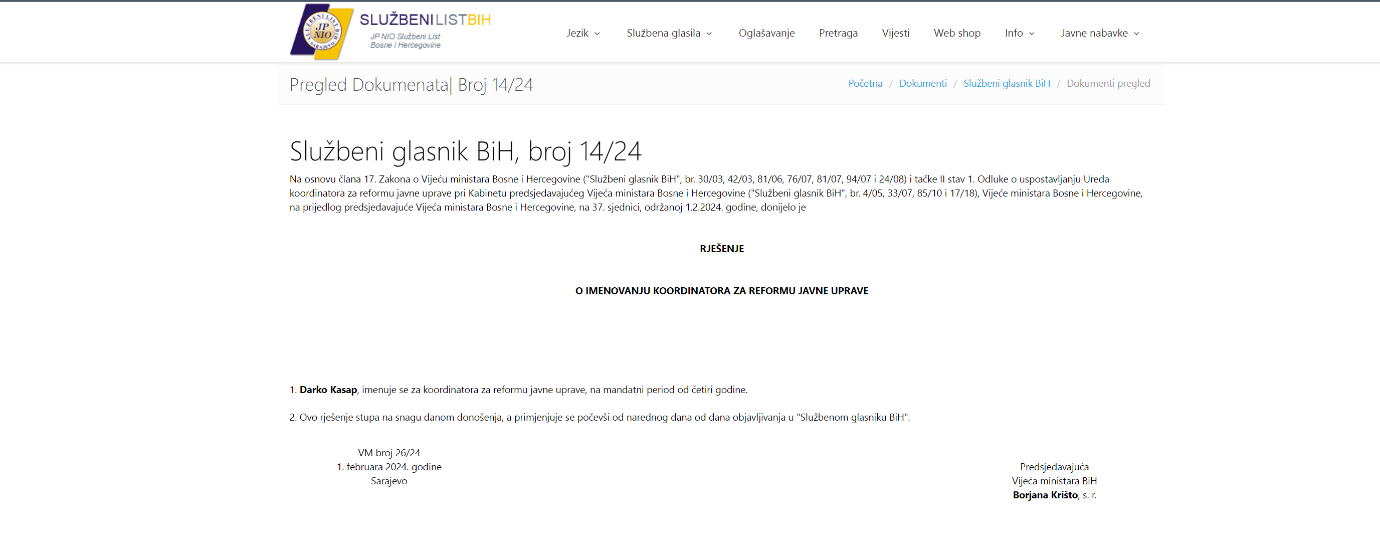
According to information available on parco.gov.ba, it is evident that the deputy coordinator possesses a higher level of education than the coordinator. Unofficial sources suggest that Kasap ranked second on the list for the deputy position.
Recent public events have highlighted that Coordinator Kasap requires a translator, indicating a lack of proficiency in English. The University of Mostar states that he completed his “additional studies” with them.
– Darko Kasap, born on August 14, 1976, in Gradačac, Bosnia and Herzegovina, completed additional studies in Public Relations at the Faculty of Philosophy of the University of Mostar on September 21, 2012. He obtained a seventh (VII/1) degree and the professional title of Public Relations Manager– reads the response of Vladimir Vegar, media and public relations associate of the University in Mostar.
When asked about what further education entails, including the number of exams and the timeframe, we are directed to contact the Faculty of Philosophy. However, despite waiting for a month, there has been no response from there.
As a member of HDZ BiH, Kasap served as the Minister of Economy, Labor, and Spatial Planning in the Government of the Posavina Canton.
And what does the Public Administration Reform Coordinator’s Office or PARCO actually do and why are they important?
Where are the results?
Public administration reform is one of the key priorities for our country’s accession to the European Union. The Office of the Coordinator for Public Administration Reform in BiH was established by the Decision of the BiH Council of Ministers in October 2004, following the recommendation of the Feasibility Study for BiH.
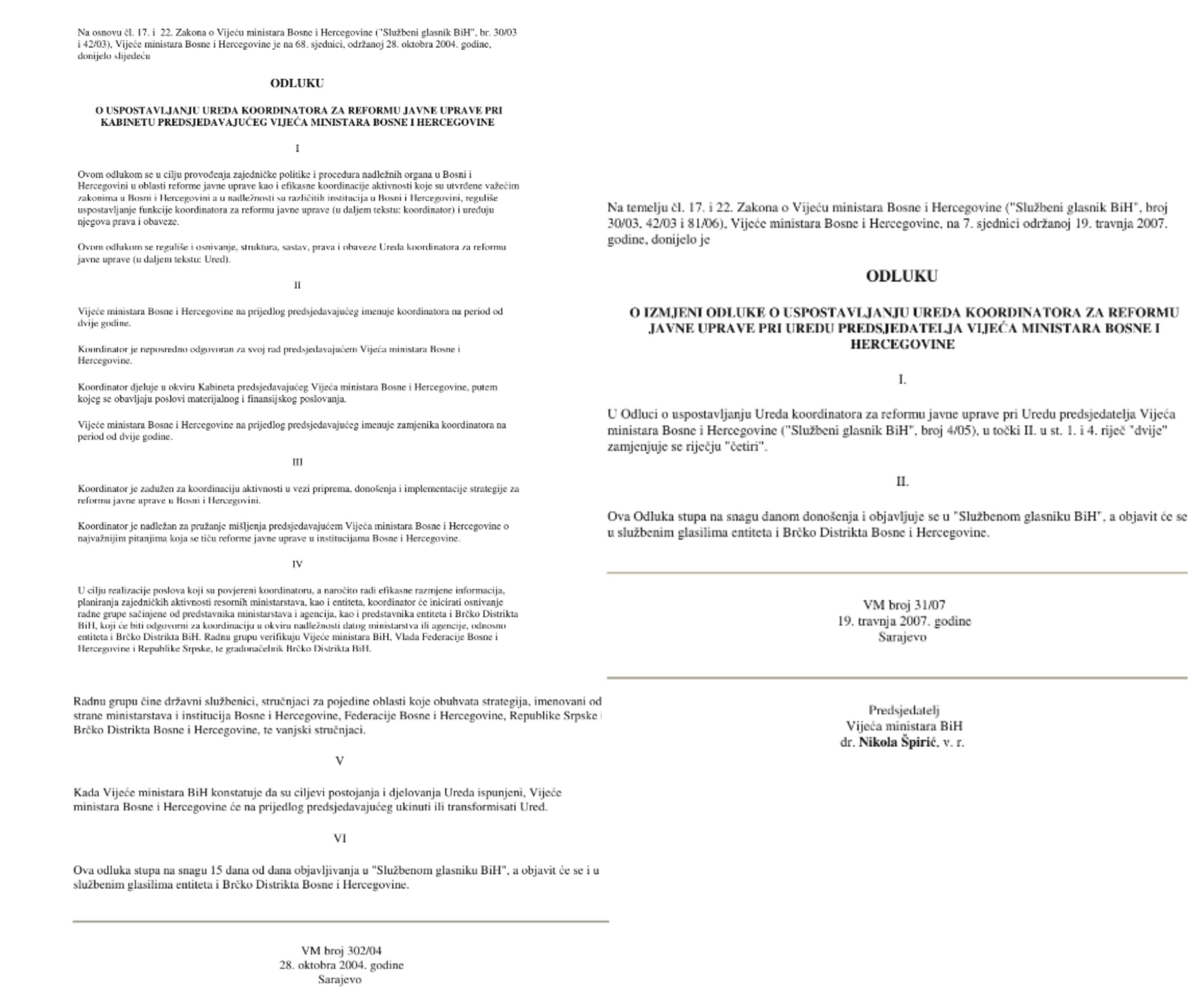
The establishment of the Office was “a response to the citizens’ needs for a more efficient and accountable public administration at all levels of government, capable of meeting BiH’s obligations in the European integration process. At that time, the coordinator had only one deputy.”
Postpone the deadline, postpone the deadline, postpone the deadline…
The action plan for public administration reform was adopted in December 2020. Two years later, the Strategic Framework for Public Administration Reform in BiH 2018-2022 was adopted, and its validity extended until 2027. This extension shifts the deadlines set by the Strategic Framework by five years, thus linearly shifting the deadlines for implementing activities outlined in the Action Plan for Public Administration Reform, as indicated in the budget request for 2024. (https://parco.gov.ba/hr/transparentnost/budzetska-transparentnost/, point 165).
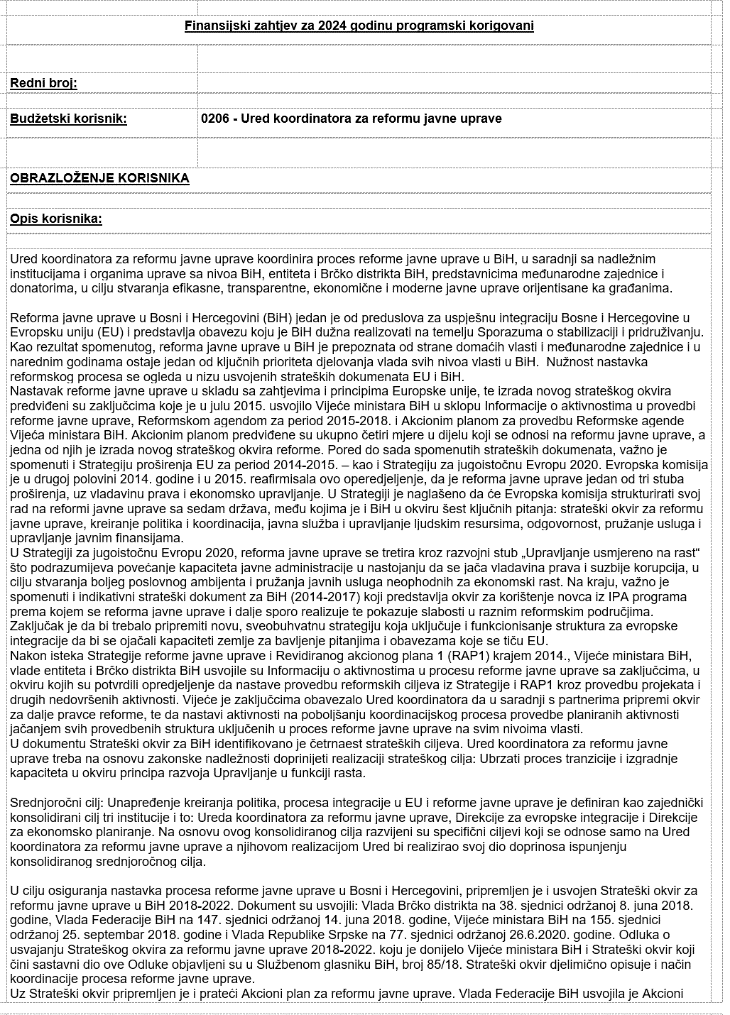
The office employs 38 people, with a budget of around 2 million KM. Close to 1.7 million KM is allocated for employee expenses, travel expenses, and service contracts.
The Public Administration Reform Fund has been frozen since 2017, with the current balance standing at 10 million KM. Previously, 5 million KM had to be returned to the donor due to unsatisfactory results.
Progress, with 78% not implemented
According to the latest published or available report, the Office had made “some progress in the reform of public administration” in 2023.
– In 2023, Bosnia and Herzegovina made some progress in public administration reform. Measurement of progress in the implementation of the Action Plan for Public Administration Reform indicates that 15.79% of the Action Plan’s activities had been implemented by the end of 2023. This represents a 1.48% increase compared to the progress measured in the first half of 2023, and a 1.79% increase compared to the progress measured at the end of 2022.The progress is relative, calculated as an average of achieved progress across administrative levels. Considering that the Action Plan includes defined indicators for BiH as a whole, activities with binary indicators require all levels of government to complete them for fulfillment. In 2023, 7.35% of activities were fully completed, marking a 0.74% improvement from the previous semiannual reporting period. Additionally, 9.55% of activities were partially completed, reflecting a 1.46% improvement compared to the same reporting period– reads the Report on implementation of Strategic framework for public administration reform in BiH (https://parco.gov.ba/en/dokumenti/izvjestaji/izvjestaji-o-napretku-rju/izvjestaj-o-napretku-2023-finalna-verzija/ ).
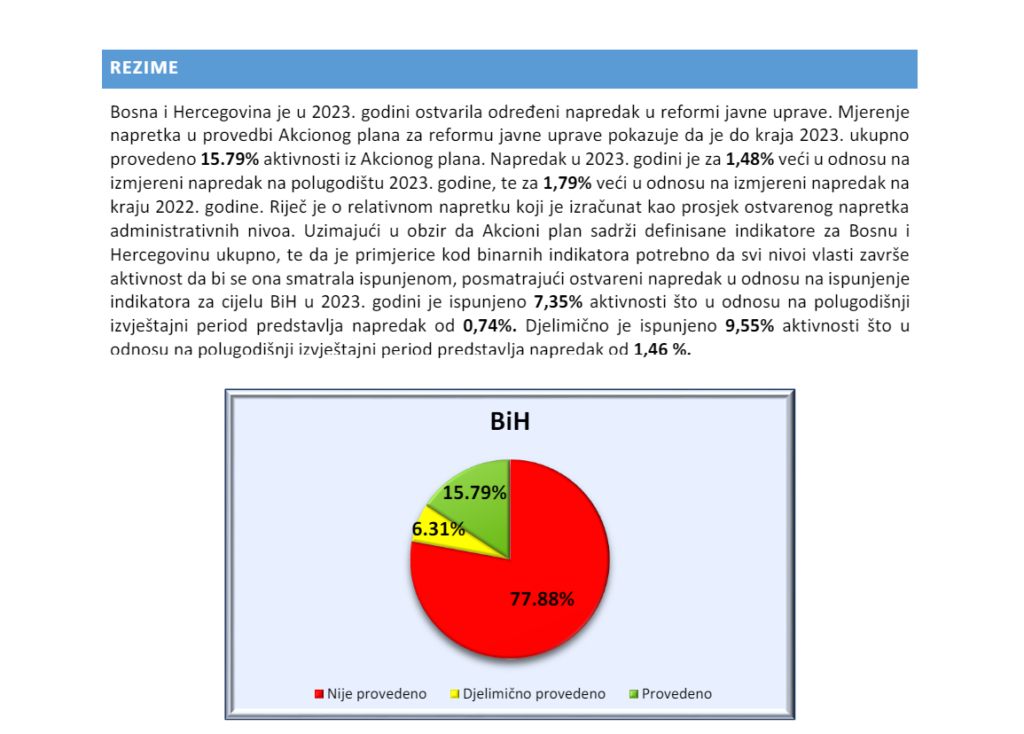
Millions, planes, trucks (of money)
According to this report, 84% of activities in the Policy Making and Coordination segment are unfulfilled; in Civil Service and Human Resources Management 59% remains unfulfilled; in segment of Accountability 96% of activities are unfulfilled; in Service Provision segment 91% of activities are unfulfilled; and in Public Finance Management, all activities specified in the Action Plan for Public Administration Reform have been completed.
The Office conducted a cost estimation of reform for the implementation of the Strategic Framework and Action Plan. – The total costs were estimated at 61.66 million marks. Of this amount, 5.09 million KM (8%) are implementation costs, partially secured by donor funding, while financing for 56.57 million KM (92%) remains unsecured. Since the expenditures to date have been covered by donor funds, credible information on specific donor contributions for these activities is not available. Potential sources of financing for the upcoming period include the Public Administration Reform Fund, which currently holds approximately 10.5 million marks provided by donors and local governments. However, the PAR Fund requires unblocking to facilitate its operations. It is anticipated that governments at all levels will collectively invest one million marks in the reform efforts, representing about 8% of the required funds. From 2020 to 2022, the European Commission, through the IPA fund, played a significant role in implementing these activities. Additionally, the German GIZ contributed through the Public Institutions Strengthening Program, which has now concluded. – reads the report from the Coordinator’s office.
How to measure promised digitalization, depoliticization, and professionalization?
Safet Kešo, representative of the opposition party- SDA in the BiH Parliamentary Assembly, also inquired about the results.
He sought a response from the BiH CoM but received a reply from the Coordinator’s Office stating that it is “not competent” to address certain questions.
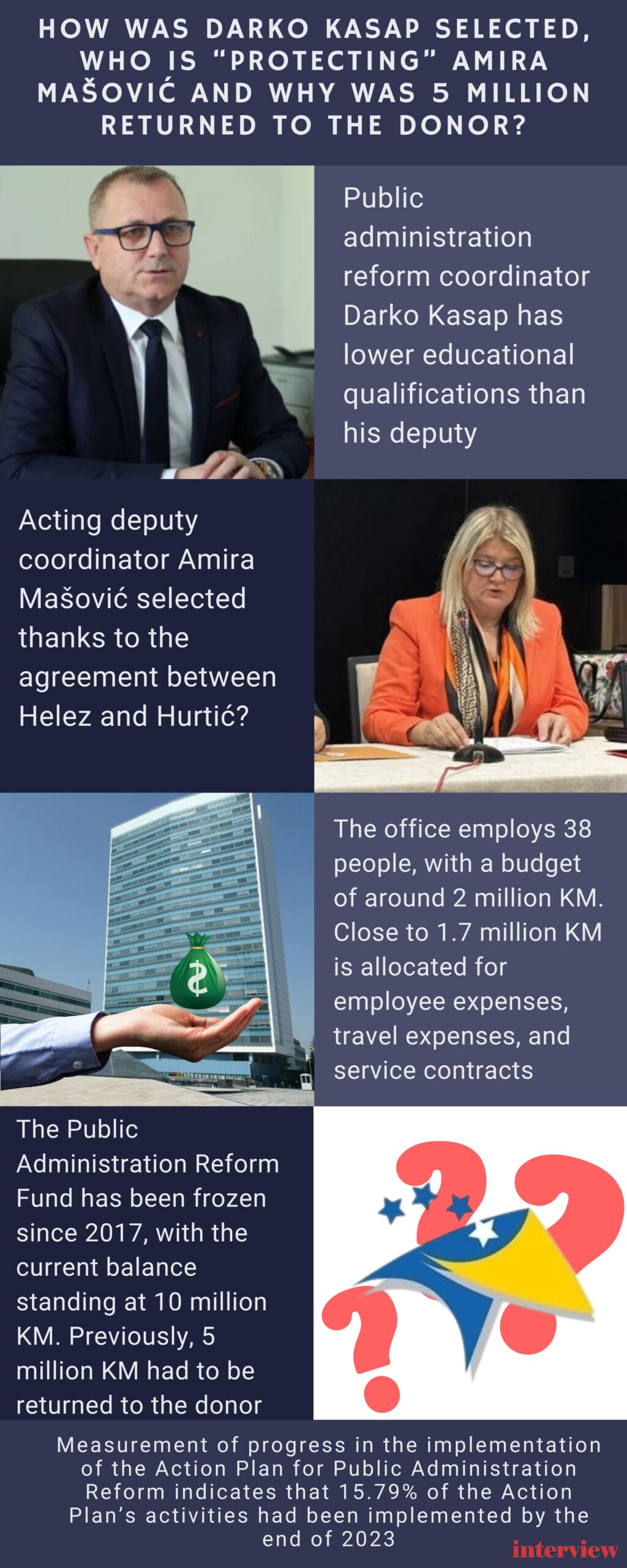
The Office clarified that public administration reform is a critical matter for BiH, influencing the country’s EU accession negotiations, and emphasized that the current Council of Ministers has committed to prioritizing reform efforts intensively.
– I’m concerned that they lack direction on how to proceed, who will take charge, and that they had expected that this Council of Ministers will complete digitizing, depoliticizing, and professionalizing the civil service. They promised a new law and pledged to monitor and coordinate decision-making across all levels of government. Despite talking about depoliticization, it appears that political influence in public administration appointments has only increased. This leads me to worry that we are heading in the wrong direction. When I asked how they plan to measure progress, they mentioned having a sound legal framework and effective legal solutions to prevent abuse, but these have to be enforced, no one will put possibility of abuse into a law. It seems to me that while the reports may suggest progress, actual practice and actions are far from meeting expectations.– said Kešo.
Office for reforms of the office for public administration reform
Activist Stefan Blagić from the Association Restart Srpska, which has been monitoring the appointment of acting officials for a long time, says that he is not surprised by the appointment of acting officials.
– For me, the primary question is what the Office of the Coordinator for Public Administration Reform has achieved. Based on the outcomes, it seems this office itself requires reform first. Therefore, I suggest that authorities consider establishing an office dedicated to reforming the public administration reform office. Perhaps this approach could lead to more effective outcomes. Regarding the appointment of acting officials, it was introduced by our authorities a few years ago. Temporary appointments increase the potential for manipulation of the appointment process, greater control over appointees, and heightened susceptibility to pressure and corrupt practices within institutions managed by acting officials. Furthermore, Prime Minister of the RS Radovan Višković openly stated that when they wish to appoint someone who does not meet requirements of the vacancy, they appoint them as acting officials – said Blagić.
Why wasn’t Mašović dismissed?
Let’s go to the beginning. It is noteworthy mentioning that on May 13 the Council of Ministers declined to relieve Amira Mašović from her duty as deputy coordinator for public administration reform, citing the expiration of her mandate pending the completion of the vacancy procedure. In two rounds of voting, which included consultations, Minister of Defense Helez, Minister of Human Rights Hurtić, and Minister of Communications and Transport Edin Forto voted against the dismissal.
Furthermore, following two rounds of voting, the Council of Ministers rejected the ranking list of successful candidates for the appointment of the deputy coordinator for public administration reform in Bosnia and Herzegovina.
New vacancy, same old practice
Now we await the results of the new vacancy. Muhamed Smajić, Secretary of the Ministry of Defense of BiH, will replace Niko Duvnjak, advisor to the chairman of the BiH Ministry of Defense, on the Commission for conducting vacancy procedure to select and to appoint coordinator and deputy coordinators for public administration reform in BiH.
According to previously published media reports, the distribution of positions was agreed upon within the coalition forming the state-level government, stipulating that the coordinator position should “belong” to the Troika, to SDP in particular. However, it remains unclear how the vacancy was initiated this time, as all previous coordinators were appointed by decisions of the BiH Council of Ministers. Moreover, it is not clear how the Secretariat of the BiH CoMs is conducting the procedure and this position belongs to HDZ BiH.
The surprise among observers of these processes escalated when, following Enver Išerić’s retirement, the position of coordinator for public administration reform in FBiH went to HDZ BiH.
(Interview.ba)



